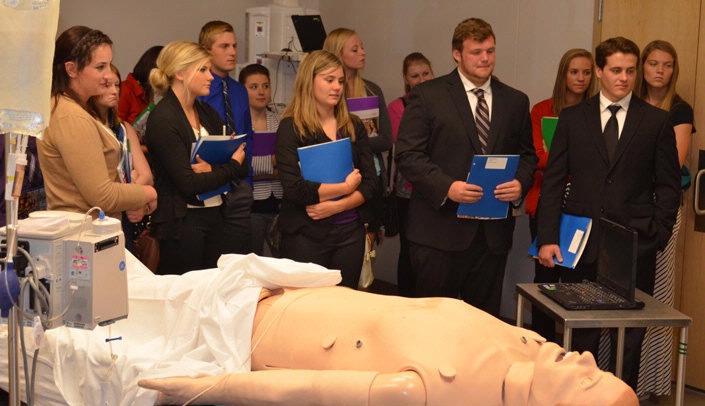Dylan Reinhardt was enjoying the chance to familiarize himself with the UNMC campus.
Kaitlyn Bergfield was impressed by the quality of the labs at UNMC.
The two college undergraduates were part of a group of 93 students from Chadron State, Peru State and Wayne State colleges, and the University of Nebraska at Kearney, who will one day attend UNMC, who got a sneak peek at the Omaha campus last week.
In addition, dentistry and dental hygiene faculty hosted nine undergraduate students from Wayne State and Chadron State colleges at the UNMC College of Dentistry in Lincoln during the event.
The UNMC colleges of allied health professions, dentistry, medicine, nursing, pharmacy and public health all hosted students during the event.
The students are active in the Rural Health Opportunities Program (RHOP), the Kearney Health Opportunities Program (KHOP) and the Public Health Early Admissions Student Track (PHEAST).
UNMC pipeline programs
UNMC’s early admission programs – the Rural Health Opportunities Program (RHOP), the Kearney Health Opportunities Program (KHOP) and the Public Health Early Admissions Student Track (PHEAST) — are designed to address the special needs of rural Nebraska by encouraging rural residents to pursue a career in the health care fields.
Students selected are guaranteed admission to UNMC as long as all stated requirements are met and the pre-professional studies at each of the undergraduate colleges are completed.
The RHOP program began in 1990. Once accepted into it, students obtain early admission into one of nine health professions at UNMC. More than 60 percent of RHOP graduates go on to practice in rural communities.
Two new programs were developed out of RHOP’s success — PHEAST, which targets undergraduates interested in public health careers began in 2011, and KHOP, which targets high school seniors interested in health care professions, began in 2010.
In Omaha, the undergraduate students — representing UNMC’s three rural health education pipeline programs — spent the day touring campus.
Visiting students preparing for College of Allied Health Professions programs in clinical lab science, physical therapy, physician assistant and radiography spent the morning learning more about the process of transferring to UNMC and toured the campus, then spent the afternoon shadowing Nebraska Medicine health care professionals.
In Lincoln, undergraduate students attended a biochemistry lecture as well as observed a preclinical lab course in operative dentistry, and those interested in dental hygiene had the opportunity to shadow in the dental hygiene clinic. They also took part in a panel discussion with former RHOP students.
Reinhardt, a PHEAST student and a senior at Peru State College, said exposure to UNMC’s epidemiology program fired his imagination. As someone familiar with health problems — he dealt with Lyme disease, and his older sister was diagnosed with lupus — Reinhardt wants to help others.
“I want to try to make a difference at the baseline of research,” he said.
Bergfield said the visit exceeded her expectations.
“I’m here to explore how your labs work,” said the Wayne State College sophomore, who will be entering the clinical laboratory science program and eventually wants to do research or lab work, perhaps for a pharmaceuticals company. “And also to see the campus — I’ve never actually seen it.”
Alexis Erbst, a third-year student at UNMC’s College of Medicine, was an RHOP student at Wayne State College.
“I’m from Stanton, Neb., which is a very small town,” she said. “Barely anybody ever goes into the medical field.”
The RHOP program was “huge” for her, she said.
“I don’t know if I would have got into medical school without it. As a small town kid, you don’t get that exposure. Some Omaha high school students are already coming to UNMC for classes. In Stanton, you’re lucky to have a biology class and an anatomy and physiology class.”
Another former RHOP student, third-year College of Pharmacy student Amanda Bown, plans to return to the western part of the state to practice.
“In RHOP, there were students from towns I’ve never heard of, and being from rural Nebraska, I feel like I’ve heard of so many,” she said. “And most people go back, so you’ve already created that network of people that are going to be all over the state.”
